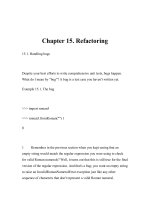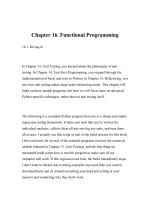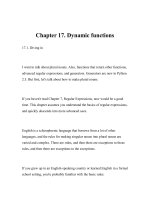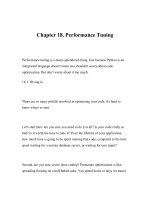Dive Into Python-Chapter 18. Performance Tuning
Bạn đang xem bản rút gọn của tài liệu. Xem và tải ngay bản đầy đủ của tài liệu tại đây (207.6 KB, 46 trang )
Chapter 18. Performance Tuning
Performance tuning is a many-splendored thing. Just because Python is an
interpreted language doesn't mean you shouldn't worry about code
optimization. But don't worry about it too much.
18.1. Diving in
There are so many pitfalls involved in optimizing your code, it's hard to
know where to start.
Let's start here: are you sure you need to do it at all? Is your code really so
bad? Is it worth the time to tune it? Over the lifetime of your application,
how much time is going to be spent running that code, compared to the time
spent waiting for a remote database server, or waiting for user input?
Second, are you sure you're done coding? Premature optimization is like
spreading frosting on a half-baked cake. You spend hours or days (or more)
optimizing your code for performance, only to discover it doesn't do what
you need it to do. That's time down the drain.
This is not to say that code optimization is worthless, but you need to look at
the whole system and decide whether it's the best use of your time. Every
minute you spend optimizing code is a minute you're not spending adding
new features, or writing documentation, or playing with your kids, or writing
unit tests.
Oh yes, unit tests. It should go without saying that you need a complete set
of unit tests before you begin performance tuning. The last thing you need is
to introduce new bugs while fiddling with your algorithms.
With these caveats in place, let's look at some techniques for optimizing
Python code. The code in question is an implementation of the Soundex
algorithm. Soundex was a method used in the early 20th century for
categorizing surnames in the United States census. It grouped similar-
sounding names together, so even if a name was misspelled, researchers had
a chance of finding it. Soundex is still used today for much the same reason,
although of course we use computerized database servers now. Most
database servers include a Soundex function.
There are several subtle variations of the Soundex algorithm. This is the one
used in this chapter:
1. Keep the first letter of the name as-is.
2. Convert the remaining letters to digits, according to a specific table:
* B, F, P, and V become 1.
* C, G, J, K, Q, S, X, and Z become 2.
* D and T become 3.
* L becomes 4.
* M and N become 5.
* R becomes 6.
* All other letters become 9.
3. Remove consecutive duplicates.
4. Remove all 9s altogether.
5. If the result is shorter than four characters (the first letter plus three
digits), pad the result with trailing zeros.
6. if the result is longer than four characters, discard everything after the
fourth character.
For example, my name, Pilgrim, becomes P942695. That has no consecutive
duplicates, so nothing to do there. Then you remove the 9s, leaving P4265.
That's too long, so you discard the excess character, leaving P426.
Another example: Woo becomes W99, which becomes W9, which becomes
W, which gets padded with zeros to become W000.
Here's a first attempt at a Soundex function:
Example 18.1. soundex/stage1/soundex1a.py
If you have not already done so, you can download this and other examples
used in this book.
import string, re
charToSoundex = {"A": "9",
"B": "1",
"C": "2",
"D": "3",
"E": "9",
"F": "1",
"G": "2",
"H": "9",
"I": "9",
"J": "2",
"K": "2",
"L": "4",
"M": "5",
"N": "5",
"O": "9",
"P": "1",
"Q": "2",
"R": "6",
"S": "2",
"T": "3",
"U": "9",
"V": "1",
"W": "9",
"X": "2",
"Y": "9",
"Z": "2"}
def soundex(source):
"convert string to Soundex equivalent"
# Soundex requirements:
# source string must be at least 1 character
# and must consist entirely of letters
allChars = string.uppercase + string.lowercase
if not re.search('^[%s]+$' % allChars, source):
return "0000"
# Soundex algorithm:
# 1. make first character uppercase
source = source[0].upper() + source[1:]
# 2. translate all other characters to Soundex digits
digits = source[0]
for s in source[1:]:
s = s.upper()
digits += charToSoundex[s]
# 3. remove consecutive duplicates
digits2 = digits[0]
for d in digits[1:]:
if digits2[-1] != d:
digits2 += d
# 4. remove all "9"s
digits3 = re.sub('9', '', digits2)
# 5. pad end with "0"s to 4 characters
while len(digits3) < 4:
digits3 += "0"
# 6. return first 4 characters
return digits3[:4]
if __name__ == '__main__':
from timeit import Timer
names = ('Woo', 'Pilgrim', 'Flingjingwaller')
for name in names:
statement = "soundex('%s')" % name
t = Timer(statement, "from __main__ import soundex")
print name.ljust(15), soundex(name), min(t.repeat())
Further Reading on Soundex
* Soundexing and Genealogy gives a chronology of the evolution of the
Soundex and its regional variations.
18.2. Using the timeit Module
The most important thing you need to know about optimizing Python code is
that you shouldn't write your own timing function.
Timing short pieces of code is incredibly complex. How much processor
time is your computer devoting to running this code? Are there things
running in the background? Are you sure? Every modern computer has
background processes running, some all the time, some intermittently. Cron
jobs fire off at consistent intervals; background services occasionally “wake
up” to do useful things like check for new mail, connect to instant messaging
servers, check for application updates, scan for viruses, check whether a disk
has been inserted into your CD drive in the last 100 nanoseconds, and so on.
Before you start your timing tests, turn everything off and disconnect from
the network. Then turn off all the things you forgot to turn off the first time,
then turn off the service that's incessantly checking whether the network has
come back yet, then ...
And then there's the matter of the variations introduced by the timing
framework itself. Does the Python interpreter cache method name lookups?
Does it cache code block compilations? Regular expressions? Will your
code have side effects if run more than once? Don't forget that you're dealing
with small fractions of a second, so small mistakes in your timing
framework will irreparably skew your results.
The Python community has a saying: “Python comes with batteries
included.” Don't write your own timing framework. Python 2.3 comes with a
perfectly good one called timeit.
Example 18.2. Introducing timeit
If you have not already done so, you can download this and other examples
used in this book.
>>> import timeit
>>> t = timeit.Timer("soundex.soundex('Pilgrim')",
... "import soundex") 1
>>> t.timeit() 2
8.21683733547
>>> t.repeat(3, 2000000) 3
[16.48319309109, 16.46128984923, 16.44203948912]
1 The timeit module defines one class, Timer, which takes two
arguments. Both arguments are strings. The first argument is the statement
you wish to time; in this case, you are timing a call to the Soundex function
within the soundex with an argument of 'Pilgrim'. The second argument to
the Timer class is the import statement that sets up the environment for the
statement. Internally, timeit sets up an isolated virtual environment,
manually executes the setup statement (importing the soundex module), then
manually compiles and executes the timed statement (calling the Soundex
function).
2 Once you have the Timer object, the easiest thing to do is call timeit(),
which calls your function 1 million times and returns the number of seconds
it took to do it.
3 The other major method of the Timer object is repeat(), which takes
two optional arguments. The first argument is the number of times to repeat
the entire test, and the second argument is the number of times to call the
timed statement within each test. Both arguments are optional, and they
default to 3 and 1000000 respectively. The repeat() method returns a list of
the times each test cycle took, in seconds.
Tip
You can use the timeit module on the command line to test an existing
Python program, without modifying the code. See
for documentation on the command-
line flags.
Note that repeat() returns a list of times. The times will almost never be
identical, due to slight variations in how much processor time the Python
interpreter is getting (and those pesky background processes that you can't
get rid of). Your first thought might be to say “Let's take the average and call
that The True Number.”
In fact, that's almost certainly wrong. The tests that took longer didn't take
longer because of variations in your code or in the Python interpreter; they
took longer because of those pesky background processes, or other factors
outside of the Python interpreter that you can't fully eliminate. If the
different timing results differ by more than a few percent, you still have too
much variability to trust the results. Otherwise, take the minimum time and
discard the rest.
Python has a handy min function that takes a list and returns the smallest
value:
>>> min(t.repeat(3, 1000000))
8.22203948912
Tip
The timeit module only works if you already know what piece of code you
need to optimize. If you have a larger Python program and don't know where
your performance problems are, check out the hotshot module.
18.3. Optimizing Regular Expressions
The first thing the Soundex function checks is whether the input is a non-
empty string of letters. What's the best way to do this?
If you answered “regular expressions”, go sit in the corner and contemplate
your bad instincts. Regular expressions are almost never the right answer;
they should be avoided whenever possible. Not only for performance
reasons, but simply because they're difficult to debug and maintain. Also for
performance reasons.
This code fragment from soundex/stage1/soundex1a.py checks whether the
function argument source is a word made entirely of letters, with at least one
letter (not the empty string):
allChars = string.uppercase + string.lowercase
if not re.search('^[%s]+$' % allChars, source):
return "0000"
How does soundex1a.py perform? For convenience, the __main__ section of
the script contains this code that calls the timeit module, sets up a timing test
with three different names, tests each name three times, and displays the
minimum time for each:
if __name__ == '__main__':
from timeit import Timer
names = ('Woo', 'Pilgrim', 'Flingjingwaller')
for name in names:
statement = "soundex('%s')" % name
t = Timer(statement, "from __main__ import soundex")
print name.ljust(15), soundex(name), min(t.repeat())
So how does soundex1a.py perform with this regular expression?
C:\samples\soundex\stage1>python soundex1a.py
Woo W000 19.3356647283
Pilgrim P426 24.0772053431
Flingjingwaller F452 35.0463220884
As you might expect, the algorithm takes significantly longer when called
with longer names. There will be a few things we can do to narrow that gap
(make the function take less relative time for longer input), but the nature of
the algorithm dictates that it will never run in constant time.
The other thing to keep in mind is that we are testing a representative sample
of names. Woo is a kind of trivial case, in that it gets shorted down to a
single letter and then padded with zeros. Pilgrim is a normal case, of average
length and a mixture of significant and ignored letters. Flingjingwaller is
extraordinarily long and contains consecutive duplicates. Other tests might
also be helpful, but this hits a good range of different cases.
So what about that regular expression? Well, it's inefficient. Since the
expression is testing for ranges of characters (A-Z in uppercase, and a-z in
lowercase), we can use a shorthand regular expression syntax. Here is
soundex/stage1/soundex1b.py:
if not re.search('^[A-Za-z]+$', source):
return "0000"
timeit says soundex1b.py is slightly faster than soundex1a.py, but nothing to
get terribly excited about:
C:\samples\soundex\stage1>python soundex1b.py
Woo W000 17.1361133887
Pilgrim P426 21.8201693232
Flingjingwaller F452 32.7262294509
We saw in Section 15.3, “Refactoring” that regular expressions can be
compiled and reused for faster results. Since this regular expression never
changes across function calls, we can compile it once and use the compiled
version. Here is soundex/stage1/soundex1c.py:
isOnlyChars = re.compile('^[A-Za-z]+$').search
def soundex(source):
if not isOnlyChars(source):
return "0000"
Using a compiled regular expression in soundex1c.py is significantly faster:
C:\samples\soundex\stage1>python soundex1c.py
Woo W000 14.5348347346
Pilgrim P426 19.2784703084
Flingjingwaller F452 30.0893873383
But is this the wrong path? The logic here is simple: the input source needs
to be non-empty, and it needs to be composed entirely of letters. Wouldn't it
be faster to write a loop checking each character, and do away with regular
expressions altogether?
Here is soundex/stage1/soundex1d.py:
if not source:
return "0000"
for c in source:
if not ('A' <= c <= 'Z') and not ('a' <= c <= 'z'):
return "0000"
It turns out that this technique in soundex1d.py is not faster than using a
compiled regular expression (although it is faster than using a non-compiled
regular expression):
C:\samples\soundex\stage1>python soundex1d.py
Woo W000 15.4065058548









